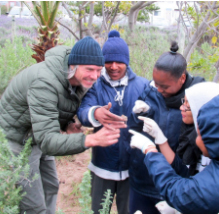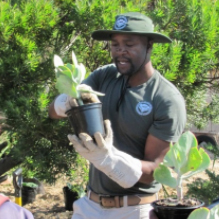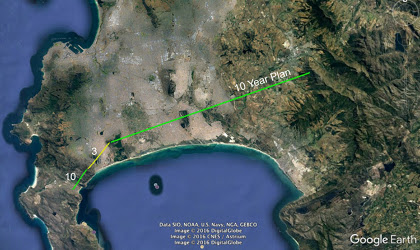
SU brings biodiversity and community together
The Ingcungcu Sunbird Restoration Initiative
The Ingcungcu Initiative, named after the Xhosa word for “birds with long beaks", aims to re-open a migration corridor for nectar-feeding birds across the City of Cape Town by planting gardens of bird-pollinating plants on school grounds.
Led by Prof. Anton Pauw of the Department of Botany and Zoology at Stellenbosch University (SU) and Bongani Mnisi, head of nature conservation for the City of Cape Town, the initiative involves learners and teachers from eight schools across the Peninsula and numerous partners from the greater community. Ceinwen Smith, a private conservation and education consultant, is currently managing the project.
The project started in 2013 when Bongani, then a part-time student at SU, decided to write his master's thesis on how restoring the nectar-feeding bird community can identify and nurture leadership for biodiversity. His supervisors, Prof. Pauw (PhD) and Dr Sjirk Geerts (PhD), based at the Cape Peninsula University of Technology, guided Bongani down the path that has today led to a highly successful biodiversity and community initiative.

Although there are only four species of obligate nectar-feeding birds in the Cape, they are the pollinators of about 350 plant species.
In order to test the theory regarding the importance of habitat corridors for the maintenance of biodiversity, eight schools were chosen as locations for the cultivation of gardens containing bird-pollinating plants.
The eight schools were selected to form a corridor linking part of the Table Mountain National Park with the isolated Rondevlei Nature Reserve on the Cape Flats. Gardens measuring around 200 m2 were established at the four high schools in April/May 2014 and at four primary schools in August 2017. The learners and staff from each school are involved in the preparation and planting of the gardens, and were taught how to identify and record bird sightings.

“The project is still in a very early stage and the effects are still small. Malachite sunbirds were seen in the gardens for the first time in 2016. However‚ the effects on learners were more impressive‚ with a significant increase in their knowledge of nature," said Bongani.
Aside from SU being involved in the hands-on application of research findings, leading to scientific papers and improved environmental health, the initiative provides learners with an opportunity to become active role players in the creation of a more sustainable future.
Both the schools and the environment benefit from the gardens, which provide an increase in green spaces in the urban environment and an opportunity to connect with nature.

There has been widespread support for the initiative and future plans include the possibility of an app to assist with identifying and recording bird sightings. The collection of seeds and sourcing of plants remain challenges for the dedicated team.
For more information regarding this initiative and how to get involved, please visit the following websites:
Stellenbosch University Social Impact Initiative Profile
